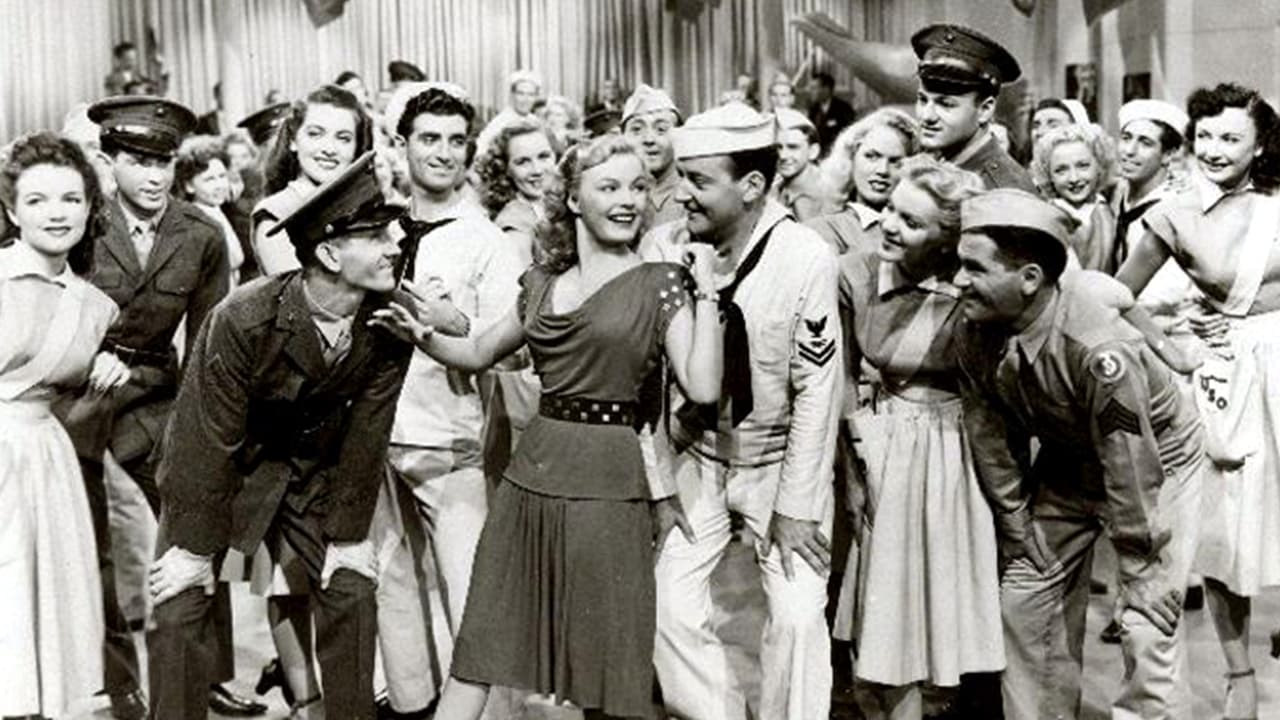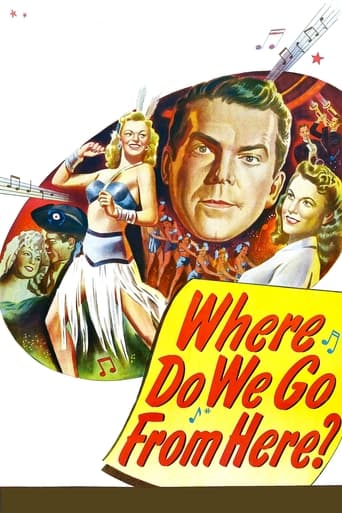



SERIOUSLY. This is what the crap Hollywood still puts out?
View MorePlot so thin, it passes unnoticed.
Easily the biggest piece of Right wing non sense propaganda I ever saw.
View MoreStrong acting helps the film overcome an uncertain premise and create characters that hold our attention absolutely.
View MoreWartime patriotism and escapism blend together in this amiable, but unspectacular musical. MacMurray is a towering, ostensibly-hearty man who is graded 4-F by the government and thus cannot enter the Armed Forces during WWII. He wants nothing more than to join up and beat the "Japs" (with the possible exception of wooing Leslie.) One evening, while helping an old woman with some scrap metal, he resurrects a genie who, in gratitude, grants him several wishes. His primary wish, to be in the service, sends him reeling back in time to the Revolutionary War, where he is serving under George Washington! This sort of thing continues as he finds himself on Columbus's flagship, on the island of Manhattan back when it was Indian territory and in Puritanical times. (Interestingly, the Civil War is left out.) In all the time frames, he sees various incarnations of the two ladies (Leslie and Haver) he has flirtations with in 1945. Finally, the genie assists him back to the 20th century where he hopes to somehow enlist in the Army. MacMurray is a friendly, easy-going presence and has a nice enough, if not amazing, singing voice. The ladies are attractive and sing well, but are not particularly distinctive. The best singing in the film comes from the rich-toned Ramirez who threatens mutiny on Columbus in a mini-operetta. The humor is light and simple-minded. The film never aspires to be anything other than morale-building froth, which is what the country needed at the time. Though most of the music is pretty enough and the costumes and sets are colorful, there isn't really anything overly memorable or striking about the film. Apart from the Columbus section, the only really zippy part is a number in a canteen with all the branches of service and Leslie daringly dancing on barstools. Still, it's an easy, appealing movie that has variety, if nothing else. MacMurray infiltrates a German beer hall (which is presented as rather charming in spite of the fact that the US was at war with Germany at the time!) and imitates Adolph Hitler at one point. Quinn shows up as a "Me Indian Chief" sort of Native American character (while Leslie dons what had to be an eye-opening, for 1945, two-piece costume.) The film has some fairly innovative opening credits and some fairly decent (for the time) special effects. Coincidentally, MacMurray later married Haver in real-life (after her short-lived stint in the convent) though here he is more after Leslie. Ironically, Haver and MacMurray adopted twins while Leslie had a set of her own naturally. One note: The first poster seems to have mistaken "uncredited" for "scenes deleted". While a section featuring Roy Rogers and Gabby Hayes was cut, that was basically it. Most of the performers listed after were just actors whose names failed to appear in the credits. They didn't have particular sequences that were cut.
View MoreDuring a Kurt Weill celebration in Brooklyn, WHERE DO WE GO FROM HERE? was finally unearthed for a screening. It is amazing that a motion picture, from any era, that has Weill-Gershwin collaborations can possibly be missing from the screens. The score stands tall, and a CD of the material, with Gershwin and Weill, only underscores its merits, which are considerable. Yes, the film has its problems, but the score is not one of them. Ratoff is not in his element as the director of this musical fantasy, and Fred MacMurray cannot quite grasp the material. Then, too, the 'modern' segment is weakly written. BUT the fantasy elements carry the film to a high mark, as does the work of the two delightful leading ladies - Joan Leslie and June Haver. Both have the charm that this kind of work desperately needs to work. As a World War II salute to our country's history - albeit in a 'never was' framework, the film has its place in Hollywood musical history and should be available for all to see and to find its considerable merits.
View MoreThis film is from 1945, in gorgeous (but a little too dark in the night-time scenes) Technicolor, with songs by Kurt Weill and Ira Gershwin! It's a war-time pageant and everyone wants to get in the army, and a genie appears to help Fred MacMurray do a "Bill and Ted's Excellent Adventure" entry into various times of American history. Anthony Quinn is funny as a street-smart Indian, and I never realized how gorgeous June Haver and Joan Leslie were. So-so songs and a terrible title explain how unknown this goofy film is. Gregory Ratoff was evidentially a better actor (Symphony for Six Million) than a director, but at 77 minutes this film is worth your time, especially if you like musicals. Nice to look at, and the choreography is pretty amusing.
View MoreLook at the number of actors on the IMDB cast list who had their scenes deleted (Roy Rogers, yet!), and you'll smell trouble: It's not typical for a big, expensive Technicolor wartime musical like this one to clock in under 80 minutes. Sure enough, it's a disjointed, haphazard musical fantasy, though full of talented people behind the scenes, notably Ira Gershwin and Kurt Weill. The songwriters bring a little pep to the story of a 4-F wannabe soldier who finds a magic lamp inhabited by an inept genie, who keeps putting him into the wrong century. The historic events visited feel terribly random -- the American Revolution, Columbus' voyage, Puritan New England -- and make one curious about what sequences were omitted. It's a cute idea -- the screenwriters, Morrie Ryskind and Sig Herzig, were Broadway veterans, and one suspects they originally conceived this as a stage musical -- but it's spun out with little real wit, and an aggressively uninteresting supporting cast fails to mine the minimal humor in the script. MacMurray, normally not a song-and-dance man, reveals a pleasant baritone but hasn't much to play, and he looks distinctly uncharmed by either of his leading ladies, though he did in fact marry June Haver. There's one celebrated sequence, a 10-minute mini-opera-bouffe called "The Nina, the Pinta, the Santa Maria," where Bill (MacMurray) convinces Columbus' crew not to mutiny, since America needs to be discovered. (A wonderful couplet describing America's bounty was disallowed by the censors: "The girls are delightful/ Their sweaters are quite full.") Suddenly the whimsy takes off, and the singing's splendid, and the film feels as bizarre and pixilated as "The Wizard of Oz." It doesn't last, though, and then it's back to 20th Century Fox's back lot and more halfhearted jests about history and patriotism. A try at something different, certainly, in an age where Hollywood musicals were mainly backstagers, and it has its moments. But mostly it's a missed opportunity. If the missing footage ever turns up, it might be worth looking at.
View More